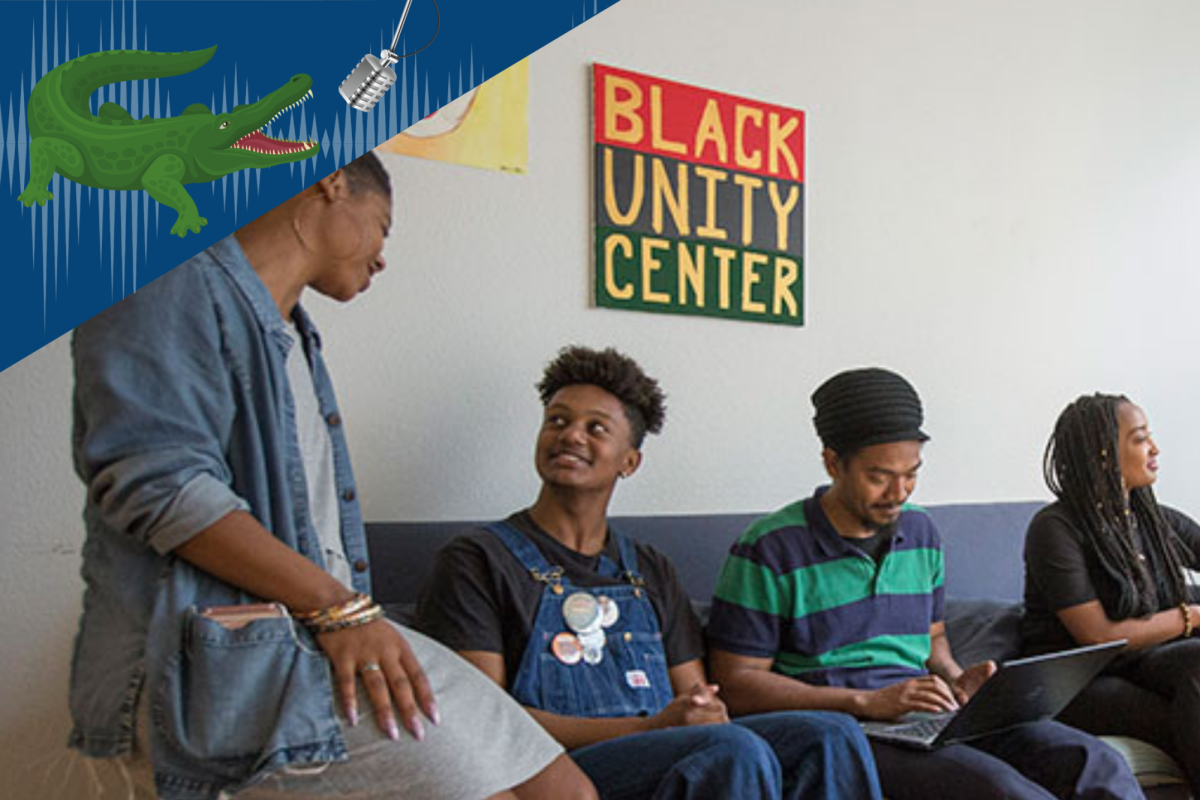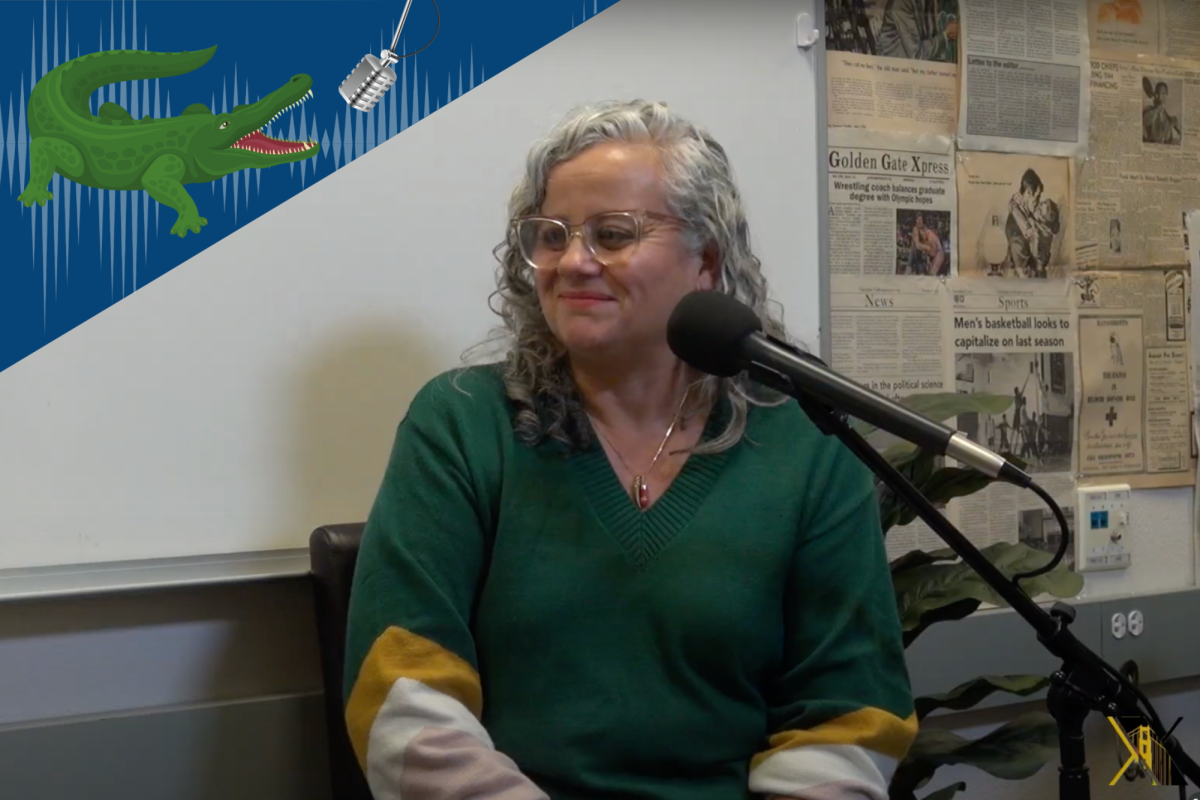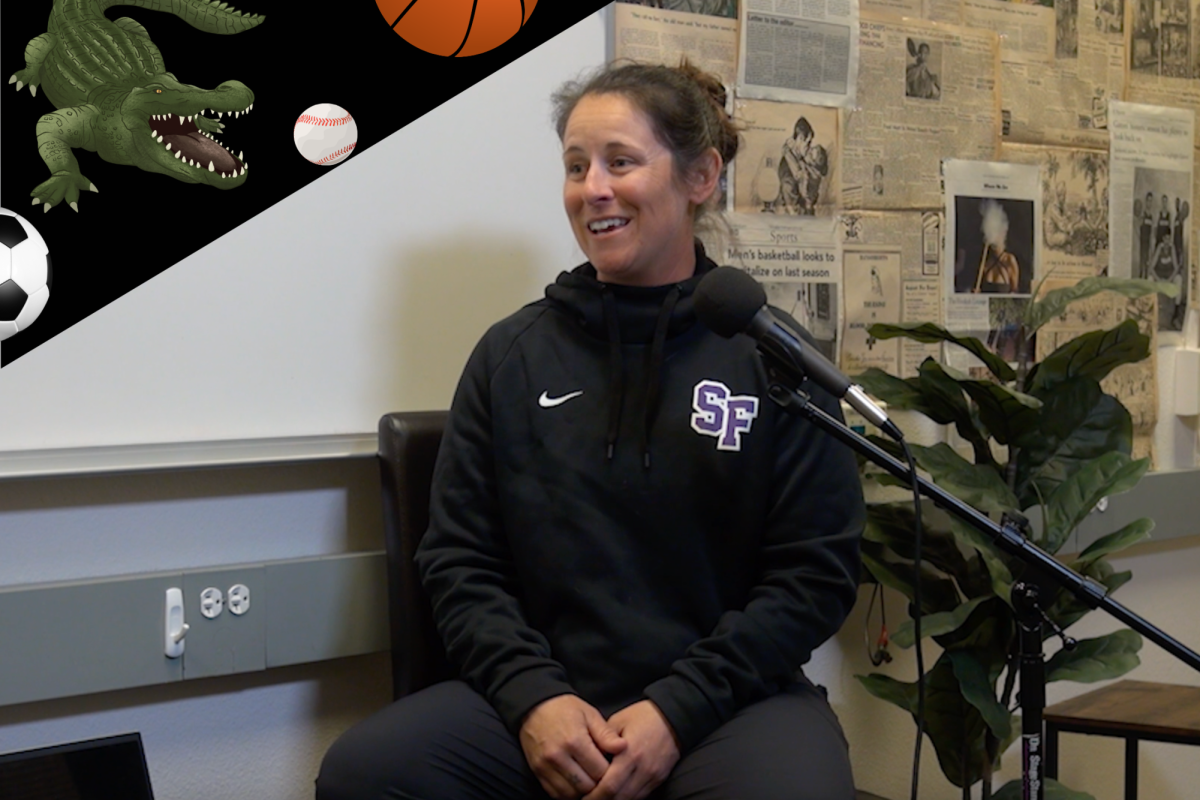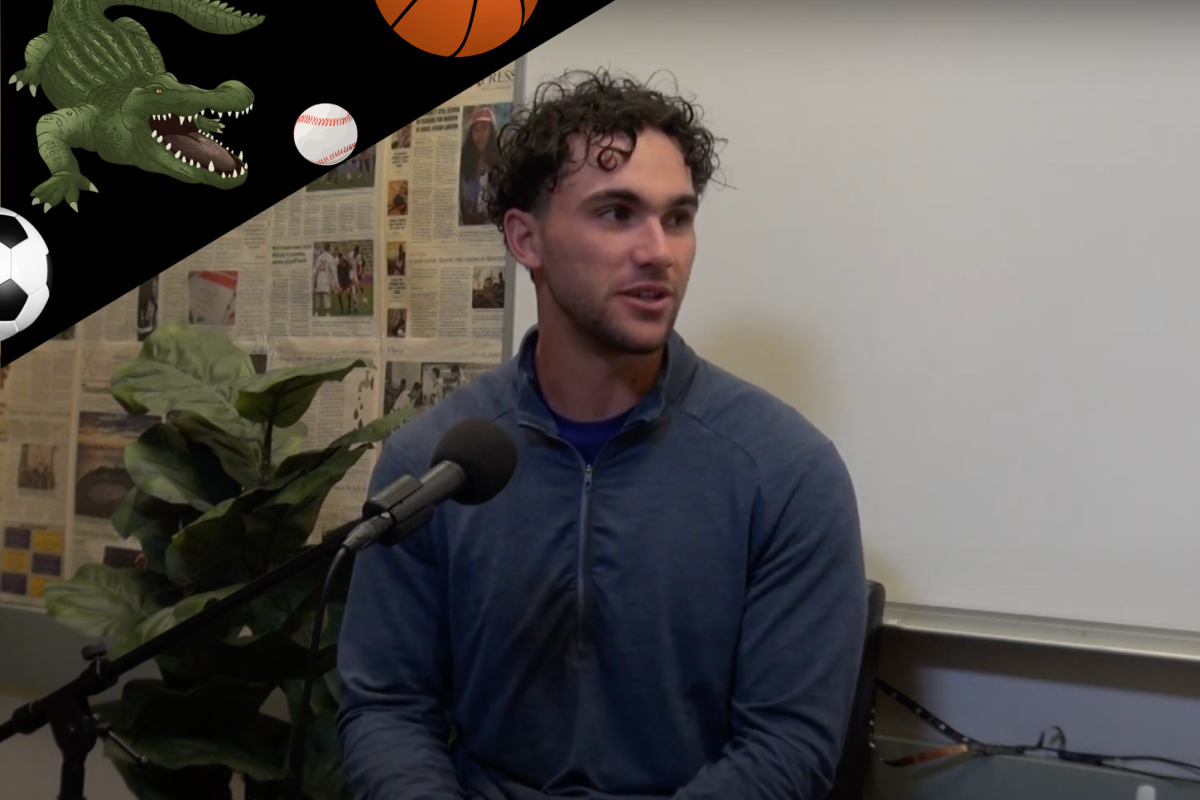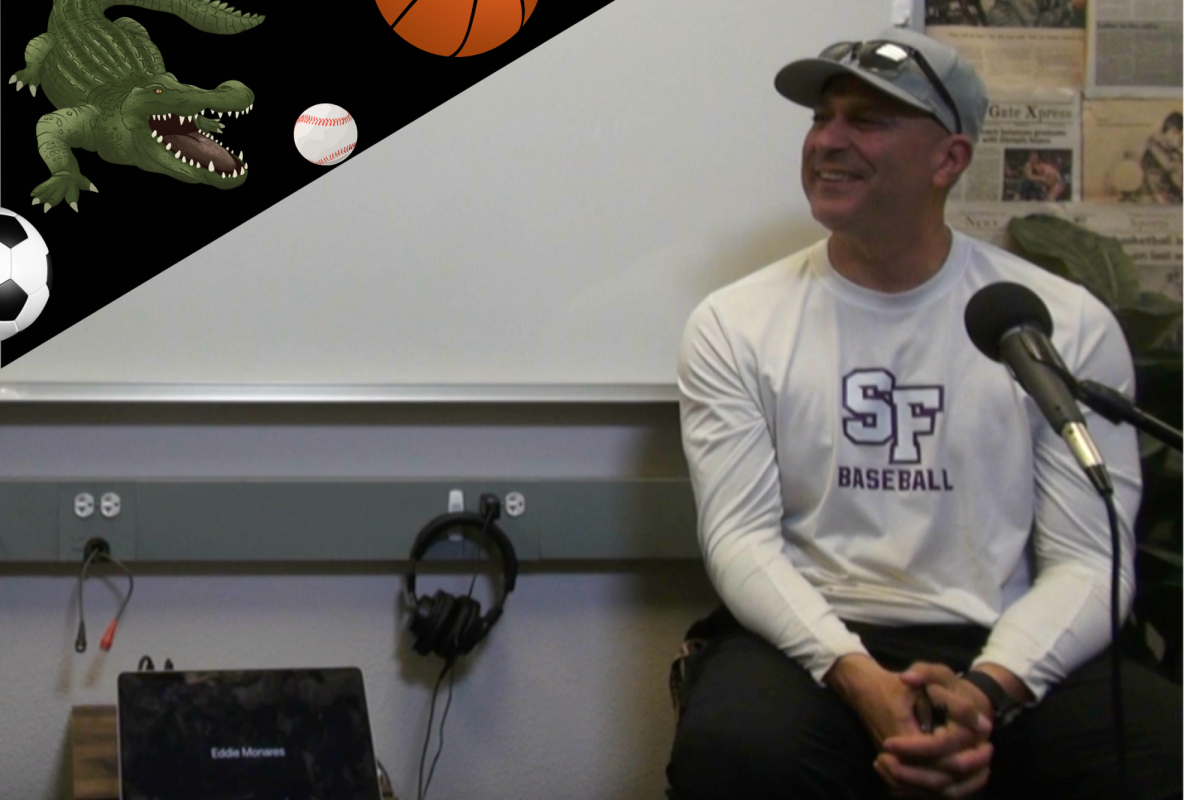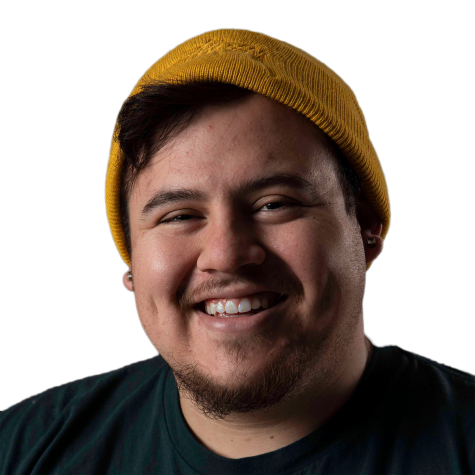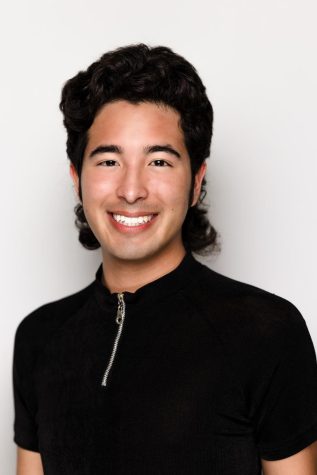Welcome to Gator Talk, a collaborative CalState podcast that brings city and statewide perspectives to SF State news.
In Gator Talk’s third episode, guest host Chris Ramirez talks with the President of the San Francisco’s Board of Supervisors, Shamann Walton. He’s the current president for the city’s board of supervisors, voted in by his fellow supervisors on the board on Feb. 8 – the vote was unanimous, too.
Chris sat down with President Walton to ask tough questions on how he’s been handling the role of president, as well as what he’s been working on with the board.
TRANSCRIPT:
*salsa song fades in*
This is Sebastian Mino-Bucheli, I’m your multimedia editor and your host for Gator Talk, a Golden Gate Xpress podcast that brings news to SF State students.
*salsa song fades out*
*mellow samba song fades in*
Preview of the show
– I’ll kick off the show with a brief monologue!
– We’ll get into a news brief that matters to SF State students!
– And lastly, our amazing editor-in-chief sat down with a supervisor from San Francisco Board of Supervisors who was making headlines early this year.
For more information/coverage, check out goldengatexpress.org OR @GatorTalkPod on all social media platforms.
*mellow samba song fades out*
*song fades in*
Monologue
I just want to take a moment and say this to you all.
This is the third week of school. I hope all is well as of now. I hope you’ve figured out a routine for your classes and life. You got this Gators!
This episode will air at the start of the Chinese New Year, the year of the Ox. Happy New Year!
This episode will also air before Valentine’s Day. Un día dedicado al amor y amistad. A day for love and friendships. Take time out of your day to celebrate with someone significant, a member of your family or friends. Just celebrate them safely!
Lastly, this is the third episode! We didn’t get canceled yet!
Help Gator Talk expand by sharing this podcast with your professors, professor’s assistants, classmates, colleagues, roommates, coworkers and dogs.
*song fades in*
News brief
- The Superbowl happened last weekend, it’s incredible to point out how no matter what team Tom Brady is in, America will root for the opposing team.
- Chinese New Year starts today. The year of the Ox
- As of late, there’s been an uptick in violence against Asian Americans. Expect a story from us at the Golden Gate Xpress
*song fades out*
Introduction
Seb: San Francisco Board of Supervisors is made up of 11 supervisors from districts all over the city and county of San Francisco. The supervisors are elected through a choice rank voting system that is held every four years and could serve two 4-year terms in succession. Most notable supervisors in the history of San Francisco Board of Supervisors are Harvey Milk, Mayor London Breed and US Senator Diane Feinstein.
Supervisors are the newsmakers. They create policy for the city and county and they also have authority on the state of the city. Most recently Supervisors Haney, Peskin, and President Yee sent a letter to President Mahoney of San Francisco State about the layoffs.
Main Story
[Voiceover/Narration]
Chris: Hi all, this is Chris Ramirez, editor-in-chief for Xpress. I’ll be taking over for the main story today.
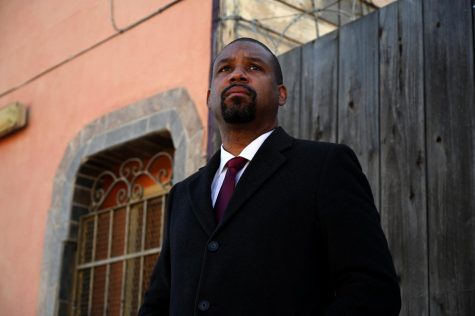
Last Friday, Feb. 5, Sebastian and I spoke with San Francisco District 10 Supervisor — er, president — Shamann Walton. He’s the current president for the city’s board of supervisors, voted in by his fellow supervisors on the board on Feb. 8 – I should add that the vote was unanimous, too.
Now-President Walton was elected as District 10 supervisor in 2018, beating out his opponent, Tony Kelly. We sat down with him to ask him the tough questions about how he’s been handling the role of president, as well as what he’s been working on with the board.
[Interview Audio]
Chris: Alright, so president Walton, Happy Friday, thanks for talking to us, I guess my first question I want to ask is probably gonna be my toughest question for you, it’s just gonna be, how are you holding up?
President Walton: I think we’re doing well, you know, just learning a lot, working with my colleagues, working with the rest of leadership of the city and trying to fight this pandemic. But I think we’re doing the best we can consider the circumstances.
[Voiceover/Narration]
You’re prooobbably wondering why you should care, or how this is relevant to us, right? President Walton is a Bay Area native, having grown up in Vallejo, and he’s actually an SF State alum. He received his masters in Public Administration in 2010.
[Interview Audio]
President Walton: So I actually went to SF State for a graduate program for Masters in Public Administration. And the year that I came on board at the MPA program was also the first year that the MPA program moved to Westfield Mall. So the MPN MBA program moved from the campus, the main campus down to downtown, but I did still take a few classes of course, on campus, but I just love the atmosphere. I love how the educators, you know, teach with a focus on social justice and a focus on equity. I mean, educators are diverse. Other students are diverse, and that’s important. But my daughter did graduate from SF State as well, undergrad, and she got her master’s there too. So obviously I’m a proud alumni and so proud, father to have a daughter also go to SF State, but I just remember the climate. I love being on campus in both cases, and just experiencing that diversity in the, in the focus on equity.
Chris: I wanted to ask that you kind of mentioned also help something that you appreciated about SF State was like, it’s kind of scope with regards to social justice, I guess, how did, would you say that SF State maybe have it shaped kind of your worldview, and maybe how you and how you kind of I guess, go about doing your work today?
President Walton: It definitely played a role. I mean, obviously, I’ve had a lot of mentors, you know, I did go to her- historically black college, and university, growing up, and, you know, living in public housing, and, you know, moving from San Francisco and living in Vallejo. So I’ve had many different experiences that have shaped what we fight for, and what we try to do, you know, just, just from life experience as a whole. But SF State definitely played a major role in where I am today. In fact, the things that I learned in the MPA program are directly related and connected to a lot of the work I’ve been able to accomplish.
[Voiceover/Narration]
Chris: Quick side note: I think it’s absolutely crucial to note that during our interview, President Walton was sporting an “SFSU Dad” shirt.
He also mentioned that he could see himself in the future returning to SF State to teach, similar to other Bay Area icons such as Jackie Fielder, who ran for state senator against Sen. Scott Wiener this past election cycle, and Michael Krasney, soon-to-be-retired KQED radio host of the “The Forum.” Krasney announced his retirement this past December, and the BOS honored him on Feb. 2 with a city holiday of Michael Krasny Day, set for Feb. 15
In the two years, President Walton has been on the board, he’s amassed a pretty impressive resume of achievements. Some of these include, and brace yourself for this:
- Working with Mayor London Breed to ultimately divest $120 million to the Black community
- Championing the closure of juvenile hall— set for the end of 2021
- The creation of the African American reparations task force
- Leading the push for the passage of Prop D on the ballot this past November, which creates the Sheriff’s Department Oversight Board for San Francisco
- Worked to ban e-cigarettes in San Francisco
[Interview Audio]
President Walton: They were targeting our young people, as young as Middle School, and they’re getting them addicted to nicotine. And that was, I think, one of the first big things that we were able to accomplish, and we were happy about that. All of the work that you mentioned is still a lot to do. So for instance, we’ve got to get the reparations task force up and running and actually get the reparations plan in a package, we still have to get the final plan for the closure of juvenile hall, for it to close at the end of the month. You know, we’re still working out on how the resources that we redirected from the police department to invest in the black community, with us all going to look like and so, you know, until we see things through to the finish, I would just say I’m excited about all that work and all those opportunities. But I can’t say that we actually did ban e-cigarettes in San Francisco, we were successful in doing that. And I think that’s going to, you know, lead to less of our young people being targeted and exploited, and have an opportunity to become addicted to nicotine through these devices.
Chris: And correct me if I’m wrong, but I have regarding the task force applications are currently the application process currently open right now. Correct?
President Walton: Correct. The seats are spelled out, you know, they each have a definitive criteria. Folks who’ve lived in public housing, folks who may have owned a black business, folks who may have suffered from overcriminalization is really set up for people who have experienced the injustice is that we’re going to be trying to fight and solve through the reparations process.
[Voiceover/Narration]
Chris: We’ll be right back.
BREAK
Seb narration: Support the Golden Gate Xpress’ work by signing up for our online newsletter, following us on Instagram or Twitter @ GGXnews and visiting the website: https://goldengatexpress.org
Interested in advertising with GGX? Check out our advertising page on goldengatexpress.org/advertising.
Our Editor-in-Chief Chris Ramirez launched the First 100 project that chronicles President Biden’s first 100 days in office. Check it out at https://goldengatexpress.org/category/in-depth/
Chris: So part of what makes President Walton’s role as president unique to the board is the relationships he’s forged among the other supervisors. He’s labeled as one of the more progressive board members, and he has to work to find the intersection of staying true to the ideas that his constituents voted him for, while also working with the other board members and Mayor London Breed, who despite having worked together, have had opposing views on issues. The two have butted heads on issues such as in December, when the board unanimously voted to approve funding for hotel rooms for unhoused individuals, but President Walton has some pretty solid relationships with the other supervisors.
BREAK END
[Interview Audio]
President Walton: I think if you look at San Francisco history, you’re probably not gonna find a board of supervisors that has worked better together and been more in unity in terms of the policies, and what we’re pushing, but also how we work together, even when folks might not always disagree. And so, you know, I had some strong relationships with colleagues prior to being elected to the Board of Supervisors. And we were able to strengthen a lot of those through the work and working together. And when you accomplish things, you’re able to get successful policies pushed for our communities.
[Voiceover/Narration]
Chris: I think that his response was really indicative of the no-nonsense attitude President Walton has in his leadership position, and just his overall character. We spoke prior to news breaking on Sunday that SFUSD had reached a tentative agreement toward school reopenings in the city, and he didn’t comment on it much in our conversation other than really emphasize the idea that he wanted to move forward in a productive manner and work with both the board and Mayor Breed to mitigate any divisions.
*audio/music transition*
[Interview Audio]
President Walton: One of the first things we were able to do and we’re excited about is recently at our southeast Health Center in Bayview, we were able to prioritize text testing for 65 and older, no appointments necessary drop in just for individuals that live in a 94124 and 94134 zip codes. And as you know, my district has the highest number of cases of folks that have contracted the virus along with the Mission District to your point and in terms of Black and Latino families getting the virus at higher rates. And so we have the Southeast Health Center, working on a mass vaccination site right now at the produce Martin Bayview, hopefully that will be up and running the next couple of weeks. Obviously, we have the mass site at City College, we have one that just opened up at the Moscone Center South with Kaiser in the city. Together, we have more planned sites throughout the district. And we just got to finalize, of course, numbers and dates and times and get that information out. And the hard part right now, of course, is really fighting to make sure that we get the supply that we need. The federal government is controlling that process. And you probably have heard and seen that it is real hard for folks to get the vaccine. And that’s the main thing that we’re also fighting for. But mass vaccination sites, vaccination sites within communities, so folks don’t have to go far and they can get there particularly because right now, we’re only the tier one a and that’s 65. And older folks who live in nursing homes, and our medical professionals are the main folks in that category. And so we obviously want to get thousands of folks vaccinated as soon as possible. So that the we can stop the spread of this virus. We’re trying to get to 10,000 a day for starters. But I think as we get more supply, we may be able to do more than that. So that’s, that’s what we’re hoping for.
President Walton: In terms of District 10, you know, obviously, I want this to continue to be a place where people can afford to live, I want folks to be able to own homes and raise families in and have the best schools and make this a destination place for all of San Francisco, and really folks coming from all over the Bay Area. So you know, keeping our, our residents working, making sure that they can have the housing they need to live here in the schools that are amazing for our young people. And that’s what I’m going to continue to fight for and make sure that the equity that we need still exists here. And we have to do everything we can to maintain the the Black population, and to try to get folks to come back. So that we can have a more diverse city, just like we have been used to in the past. So those things are important, I think for not only district 10 but but but for the city as a whole. And obviously for the city, I’m going to continue to focus on building more affordable housing, you know, addressing unemployment, particularly for certain populations and making sure that workers are protected and receiving what they need. But we’re going to address the wealth gap and continue to fight to make sure everybody has an opportunity to enjoy this beautiful city. And that’s something that we can only do if we address that, that wealth gap. And we’re going to continue to do that.
Chris: I think our last question just kind of, just to kind of end things is what is there anything that you know, we haven’t talked about or you know, hasn’t been addressed it that you think should be?
President Walton: Well definitely just want to say to the students, you know, I think you’re at a wonderful institution for higher learning. So the state has really made the mark and a lot of things that are important in in still exist today. You know, whether we talk about the first campus to do ethnic studies, or we talk about a lot of the movements, you know, during the Civil Rights movement and just to fight for equity, and so social justice. So, folks should feel proud and excited and happy to be a part of a school that continues to, to not only educate people and make sure that they learn what they need academically, but also provides for a platform to get involved in the various issues that exist in our communities today.
Chris: Perfect. Yeah. Well, thank you so much for your time. President Walton. Thanks for talking on this Friday morning.
President Walton: Thank you. Have a good one.
*Salsa song fades in*
End
And that was the episode.
This is Chris Ramirez. I’m your Editor-In-Chief and your ~ guest host ~ for Gator Talk.
New episodes will premiere Friday mornings so stay tuned.
And with that, I’m signing off.
*Salsa song fades out*







